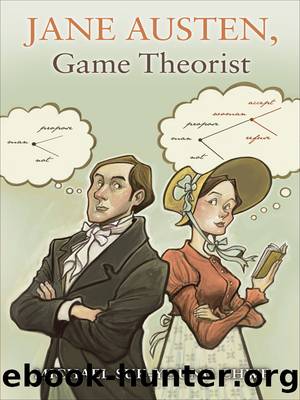Jane Austen, Game Theorist by Chwe Michael Suk-Young

Author:Chwe, Michael Suk-Young
Language: eng
Format: epub
Publisher: Princeton University Press
Published: 2013-03-14T16:00:00+00:00
STRATEGIC THINKING IS NOT ECONOMISTIC
Strategic thinking can also be confused with a variety of concepts related to âeconomy,â such as thrift, materialism, and money-centrism. But Austen clearly distinguishes between economistic values and strategic thinking, especially through Mrs. Norris, who follows âa very strict line of economy,â with ânothing to impede her frugalityâ (MP, p. 9). She wants to continue with the play Loversâ Vows regardless of the playâs subject or whether Sir Thomas would approve, because âthe preparations will be all so much money thrown awayâand I am sure that would be a discredit to us allâ (MP, p. 166). Sewing a curtain for the stage, she manages through meticulous planning to save a whopping three-fourths of a yard out of an entire bolt of green baize. When Sir Thomas returns and the play is called off, the curtain âwent off with her to her cottage, where she happened to be particularly in want of green baizeâ (MP, p. 228). Mrs. Norris thinks of herself as a strategic sophisticate. But, as discussed in chapter 5, when she maneuvers to exclude Fanny from the trip to Sotherton, âmore from partiality for her own scheme, because it was her own, than from any thing else,â Edmund easily bests her, having already secured an invitation for Fanny (MP, p. 92). Mrs. Norris is proudest of Mariaâs marriage with Mr. Rushworth: âShe took to herself all the credit of bringing Mr. Rushworthâs admiration of Maria to any effectâ (MP, p. 221). But the marriageâs unsoundness should have been obvious from the start; at the wedding, Sir Thomas is anxious, but Mrs. Norris âwas all joyous delight.⦠[N]o one would have supposed, from her confident triumph, that she ⦠could have the smallest insight into the disposition of the niece who had been brought up under her eyeâ (MP, pp. 237â38).
The strategic sophomore John Dashwood also believes in the cash nexus, evaluating his sister Marianneâs illness as an income reduction: âAt her time of life, any thing of an illness destroys the bloom for ever! ⦠I question whether Marianne now, willmarry a manworthmore than five or six hundred a-year, at the utmostâ (SS, p. 258). When he hears that Colonel Brandon has offered a living to Edward Ferrars, he evaluates the offer not in terms of the Colonelâs kindness but in the livingâs monetary value had he sold it instead: â[S]upposing the late incumbent to have been old and sickly, and likely to vacate it soonâhe might have got I dare sayâfourteen hundred poundsâ (SS, p. 334).
Of course Austenâs strategically skilled heroines do not ignore money altogether. Marianne believes that marriage cannot be âonly a commercial exchange, in which each wished to be benefited at the expense of the otherâ (SS, p. 45), and that âmoney can only give happiness where there is nothing else to give itâ (SS, p. 105), but famously states her basic needs as â[a]bout eighteen hundred or two thousand a-year,â twice what Elinor thinks luxurious (SS, p. 105). When Elizabeth talks to Mrs.
Download
This site does not store any files on its server. We only index and link to content provided by other sites. Please contact the content providers to delete copyright contents if any and email us, we'll remove relevant links or contents immediately.
| Biomathematics | Differential Equations |
| Game Theory | Graph Theory |
| Linear Programming | Probability & Statistics |
| Statistics | Stochastic Modeling |
| Vector Analysis |
Modelling of Convective Heat and Mass Transfer in Rotating Flows by Igor V. Shevchuk(6424)
Weapons of Math Destruction by Cathy O'Neil(6253)
Factfulness: Ten Reasons We're Wrong About the World – and Why Things Are Better Than You Think by Hans Rosling(4727)
A Mind For Numbers: How to Excel at Math and Science (Even If You Flunked Algebra) by Barbara Oakley(3290)
Descartes' Error by Antonio Damasio(3264)
Factfulness_Ten Reasons We're Wrong About the World_and Why Things Are Better Than You Think by Hans Rosling(3228)
TCP IP by Todd Lammle(3174)
Fooled by Randomness: The Hidden Role of Chance in Life and in the Markets by Nassim Nicholas Taleb(3100)
Applied Predictive Modeling by Max Kuhn & Kjell Johnson(3058)
The Tyranny of Metrics by Jerry Z. Muller(3055)
The Book of Numbers by Peter Bentley(2959)
The Great Unknown by Marcus du Sautoy(2683)
Once Upon an Algorithm by Martin Erwig(2640)
Easy Algebra Step-by-Step by Sandra Luna McCune(2623)
Lady Luck by Kristen Ashley(2572)
Police Exams Prep 2018-2019 by Kaplan Test Prep(2535)
Practical Guide To Principal Component Methods in R (Multivariate Analysis Book 2) by Alboukadel Kassambara(2533)
All Things Reconsidered by Bill Thompson III(2385)
Linear Time-Invariant Systems, Behaviors and Modules by Ulrich Oberst & Martin Scheicher & Ingrid Scheicher(2359)
